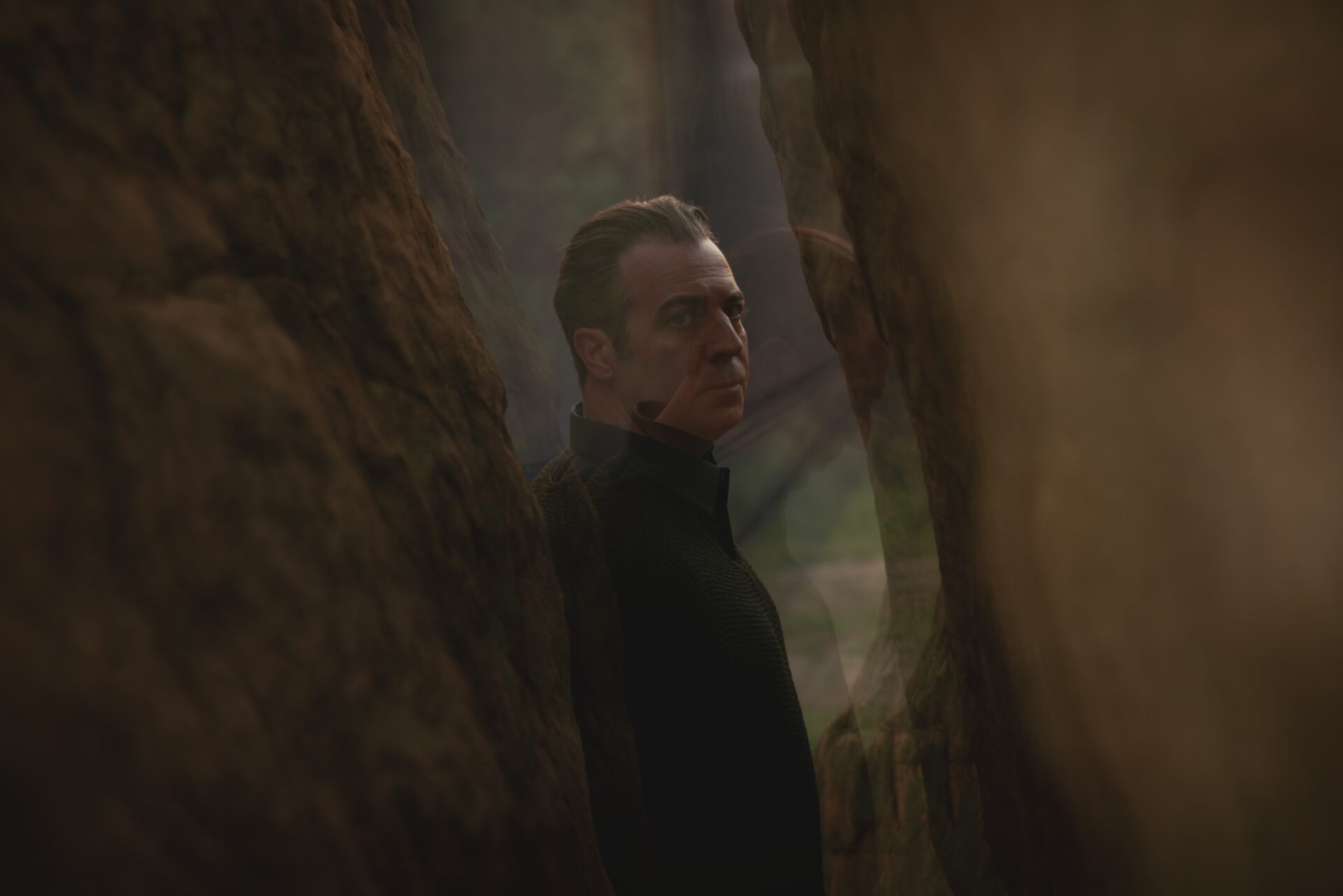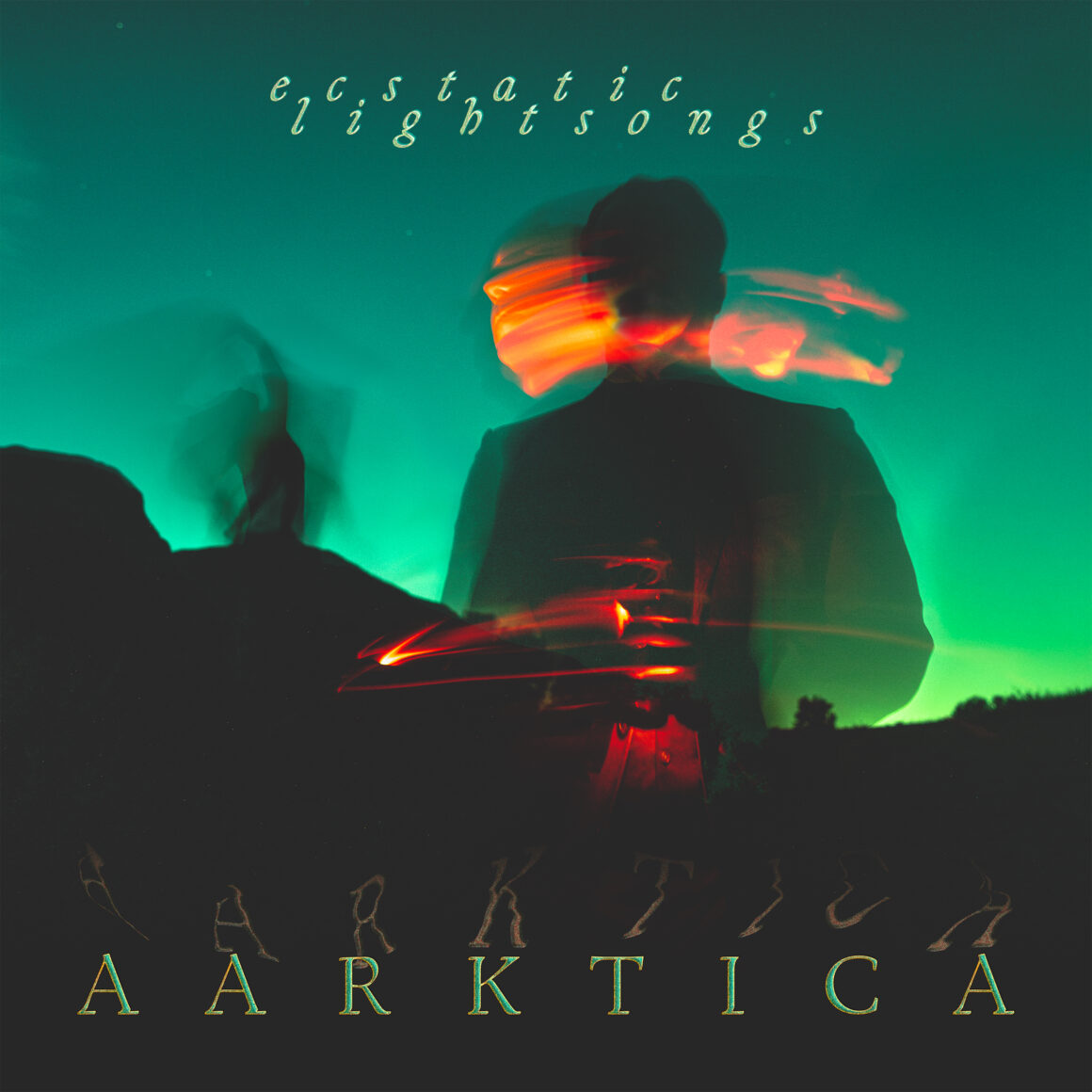Children of the stars, scanning the skies
On an earthen runway, with desperate eyes
Where his ambient opus No Solace in Sleep found Jon DeRosa navigating the numinous hush of isolation, his new album Ecstatic Lightsongs gazes upward—toward warmth, connection, and transcendence. It is the sound of the veil thinning: of an artist who once chronicled silence now seeking communion within the resonance of light. Released via HanaqPacha Records, this tenth Aarktica LP feels like a rekindled prayer—part post-punk benediction, part post-rock requiem—balancing grief’s gravity with the luminous lift of faith, friendship, and sound itself.
“I envisioned this album to be a fusion of rhythm and ambience,” DeRosa notes, and it shows: the beats here don’t drive the songs so much as breathe within them. Like Talk Talk’s Laughing Stock or Felt’s Me and a Monkey on the Moon, Ecstatic Lightsongs occupies that liminal realm where restraint becomes rapture. The spaces between drum hits, the subtle decay of a synth tone, the inhale before a lyric—all become portals into reverie.
The opening track “Trick of the Light” is a softly glowing curtain rise—its buoyant rhythm and shivering guitar tones shimmering like heat off asphalt. The song captures DeRosa’s duality: equal parts melancholy and mirage. His baritone recalls Brendan Perry’s solemn poetry, while chiming keys nod to The Cure’s luminous melancholy. It’s a hypnotic overture—one that frames the record as a meditation on perception: how love, loss, and time warp our memories until truth itself becomes another trick of the light.
“To Love is to Believe” deepens that theme with spiritual resonance. Over earthy percussion and ritualistic strings, DeRosa sings like a desert prophet whispering through a sandstorm. The song swells with devotional energy—part Dead Can Dance mysticism, part Celtic folk incantation—its mantra (“Golden rays of pure light, in the emptiness…”) ascending like incense smoke. It’s one of the album’s most transportive moments: a song of surrender, radiant and solemn in equal measure.
From there, the album turns inward. “Why Say Anything?” strips things bare: acoustic strumming, tender harmonics, and a melody as fragile as breath. It’s Nick Drake by way of Durutti Column—an ode to the ineffable. “These aren’t the words I wanted to say,” DeRosa confesses, yet every line lingers like a half-remembered dream. His phrasing carries a porchlight warmth—a flicker of human connection amid the nocturnal sprawl.
“Ecstatic Light Transmission” then dissolves language entirely. An instrumental that floats between ambient and celestial, it evokes the sensation of standing under a sky pulsing with unseen frequencies. Drones ripple, guitars glimmer, and faint choral tones shimmer like halos at the edge of hearing. It’s as though DeRosa has transformed silence itself into song—a pure vibration of being.
The album’s centerpiece, “Destination Paradise,” reintroduces human dialogue through duet. Joined by Britt Warner, DeRosa stages a cosmic conversation between faith and doubt, flesh and transcendence. The two voices orbit each other—hers light and vaporous, his steady and earthbound—as strings, synths, and choral echoes spiral around them. The result feels like a celestial slow dance, a vision of redemption through shared surrender. “There’ll be a new day,” they sing, and for once, you believe them.
“Cloud Formations” continues this tender exchange, its fluttering guitars and hushed harmonies embodying the elusive intimacy of friendship and belonging. It’s wistful but not tragic, suffused with the glow of acceptance. “I don’t wanna lose it,” they repeat, mantra-like—a plea for connection as fleeting and beautiful as the clouds above them. Steel guitar sighs in the distance, lending a bittersweet Americana tint to Aarktica’s celestial palette.
By the time “The Bird That Hides Itself” unfurls its dawn-lit drones and Meierkord’s mournful cello, the album feels suspended between waking and dreaming. It’s the moment of clarity before the world returns—fragile, glowing, ephemeral. That sense of transience carries through to “Laughing in the Rain,” where fretless bass and wistful guitar arpeggios give voice to nostalgia without sentimentality. “Sorrow in new forms,” DeRosa muses, before finding catharsis not in closure but in acceptance: “One day you will find me, laughing in the rain.”
The digital edition’s closer, a stunning reinterpretation of The Chameleons’ “Second Skin,” seals the album’s message. Where the original shimmered with youthful desperation, DeRosa’s minimalist string version sounds like hard-earned grace—resilient, luminous, and aware of its own impermanence. It’s both elegy and renewal, an echo of the past refracted through new light.
Listen to Ecstatic Lightsongs below, and order here.
If No Solace in Sleep was Aarktica’s meditation on isolation, Ecstatic Lightsongs is its counterpoint—a hymn to connection, memory, and the fragile ecstasies that make existence bearable. DeRosa’s collaborators—Warner, Meierkord, Mike Pride, Lewis Pesacov, and Charles Newman—form not a band but a constellation, each performer illuminating a corner of his inner cosmos. Together they shape an album that hums with quiet revelation: not just beauty emerging from darkness, but the understanding that the two have always been entwined.
Across its nine tracks, Ecstatic Lightsongs glows with a sense of arrival—of peace hard-won through years of searching. It is music as remembrance, as benediction, as love letter to sound itself. In DeRosa’s hands, the act of listening becomes a sacred ritual: an ecstatic illumination in which light and shadow, solitude and communion, finally coexist.
Follow Aarktica:
















 Or via:
Or via: